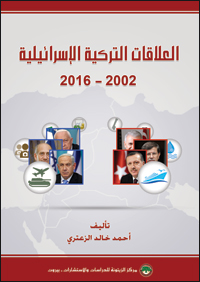Al-Zaytouna Centre for Studies and Consultations in Beirut has published a new book titled “Turkish-Israeli Relations 2002–2016,” authored by Ahmed Khaled Alzatari. The 110-page book is a thesis by which the author has acquired his Master’s Degree in Israeli Studies at Al-Quds University in 2015.
| >> Free Download: Chapter 2: Turkey and Israel’s Shared Interests |
Publication Information Arabic – Title: Al-‘Ilaqat al-Turkiyyah al-Israeliyyah 2002-2016 (Turkish-Israeli Relations 2002–2016) – Author: Ahmed Khaled Alzatari – Hard Cover: 110 pages – Published in: 2017 – Publisher: Al-Zaytouna Center for Studies and Consultations – ISBN: 978-9953-572-61-1 – Price: 6$  |
 |
This book allows the reader to examine the various aspects of Turkish-Israeli relations, moreover, it explores the phases and developments they underwent in 2002–2016, and how the two sides dealt with the cycles of deterioration and improvement in these relations.
The book is comprised of four chapters. The first chapter offers a historic overview of the political, military, and economic ties between the two countries from 1949 to 2002. It clarifies how a shift began to emerge in these relations, in accordance to the policies and foreign interests of the Turkish presidency, while being keen not to fully upend the relationship. It sheds light on the 1990s period, where Turkey began, after the Six-Day War of June 1967, to adopt more Arab friendly positions, then after the Second Gulf War, Turkey pivoted again to Israel mainly on account of its commercial interests. The first chapter also includes a lengthy account of their bilateral cooperation on water resources, with a focus on the mega projects agreed between the two countries.
The second chapter deals with Turkey and Israel’s shared interests in light of Turkey’s new foreign policy following the victory of the Justice and Development Party (AKP) in the 2002 general election. The chapter places in the hands of the reader the most prominent milestones the relations witnessed at the security, military, and intelligence levels, explaining how cooperation at those levels continued despite the political tensions between the two countries, after Turkey strongly criticized the assassination of Hamas founder Sheikh Ahmed Yassin and the Israeli war on Lebanon in July 2006. The chapter also tackles bilateral trade, which continues at a high pace, and bilateral tourism with the number of Israeli tourists peaking at half million in 2008, before decreasing markedly after the Israeli assault on Gaza in late 2008 and the sharp Turkish criticism and objection to that war.
In the third chapter, the book tackles the issues of contention between the two countries, and the impact on their relations at various levels. The chapter narrates at length the most prominent positions that led to major deterioration in relations in some cases, especially the incident involving the insulting treatment of the Turkish ambassador in Tel Aviv. Moreover, the Israeli assault on the Turkish ship Mavi Marmara killing several Turkish citizens on board, triggered angry Turkish reactions against Israel, with Ankara demanding an apology and compensation.
This has all been coupled with a Turkish bid to become a major political player in the region, manifested through its growing role in the Palestinian issue. The book overviews in some level of detail the Turkish fears of Israel intervening in some regional issues such as the war in Syria, the Kurdish question in Iraq, and rapprochement with Cyprus, as well as competing in the natural gas market and pressures by the Jewish lobby on the Turkish government through the question of Armenian displacement.
The fourth and final chapter outlines the developments witnessed by Turkish-Israeli relations in 2015–2016, with Turkey’s foreign policy seeking to build bridges with the Arab and Islamic world, and to lift the blockade on Gaza. However, despite the vicissitudes in relations with Israel, the two sides were keen to maintain commercial and economic cooperation given that both sides stood to gain from this. Following the failed coup attempt in Turkey on 15/7/2016, Israel Ministry of Foreign affairs stated that it supports Turkish democracy, which helped to restore some balance to relations with Ankara.
The book concludes with the remark that Turkish-Israeli relations are currently improving, following a six-year period of diplomatic estrangement. For one thing, Ankara realizes that its bid to have a major role in the region requires it to improve ties with Israel, while Israel knows well that its interests require the same, and require allowing Turkey to play the role it is seeking. However, this does not mean that their relations will return to their previous warm state. Rather, balance by both sides will be maintained, while differences will continue on several key issues led by the blockade of Gaza and relations with Hamas.
Al-Zaytouna Centre offers the second chapter (Turkey and Israel’s Shared Interests) for free download.
| >> Free Download: Chapter 2: Turkey and Israel’s Shared Interests |
Al-Zaytouna Centre for Studies and Consultations, 7/9/2017




Leave A Comment